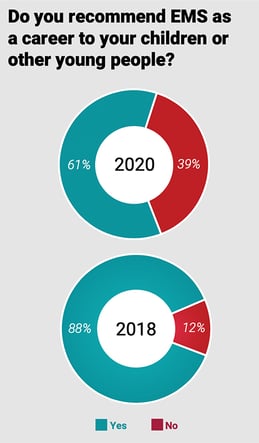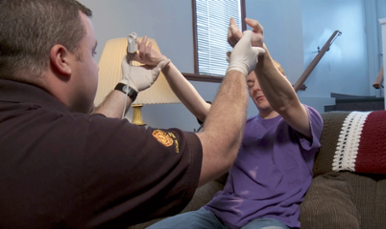Pulsara Around the World - 2025 Recap and January 2026
December Recap After an incredibly busy events year with 102 conferences, trade shows, and sponsorships, December was on the slower side for us, with...
3 min read
 Team Pulsara
:
Sep 08, 2020
Team Pulsara
:
Sep 08, 2020
![Job Attrition and Lost Passion in EMS [2020 EMS Trend Report Part 3]](https://www.pulsara.com/hubfs/Blog%20hero%20images/kris-medic-patient-home-assessment-hero@1180x700.jpg)
EDITOR'S NOTE: In July, EMS1, Fitch & Associates, and the National EMS Management Association released their third annual EMS Trend Report, proudly sponsored by Pulsara. Because the articles and advice found within contain such critical subject matter, we've elected to publish each segment one at a time here on our blog. This excerpt is from The Consequences of Lost Passion for the Job, the third entry in the 2020 Trend Report. Read, enjoy, share, and take to heart the following information brought to you by the most prestigious thought leaders in EMS.
About the Author: Anthony Minge, EdD, is a senior partner at Fitch & Associates. Prior to joining the firm, he was the business manager for Northwest MedStar in Spokane, Washington, one of the largest air medical programs in the Pacific Northwest. He holds a Doctor of Education degree in organizational leadership.
Parents typically hope for more for their children. This is not just a financial goal, but one of happiness and satisfaction, including a career that is gratifying. Parental encouragement and influential adults are contributing factors in young people’s career decisions that cannot be discounted. Many have followed in the footsteps of a parent, teacher, or other mentor who provided encouragement and endorsement of a particular field. There was a time when children took their parents to school and presented them to the class, bragging about what mom or dad did for a career. This year’s data suggests that not as many public safety/EMS parents are guests at show-and-tell.
 A key question from the 2020 EMS Trend Report survey asked, “Do you recommend EMS as a career to your children or other young people?” In the past, responses have predominantly been “yes.” In the past two years, however, respondents indicate that they would not promote the profession to the next generation. Previously, 9 in 10 respondents said they would recommend the career to their children. That number now only sits at 6 in 10. With respondents identifying recruitment and retention as a major concern in EMS year after year, this can only be seen as disturbing.
A key question from the 2020 EMS Trend Report survey asked, “Do you recommend EMS as a career to your children or other young people?” In the past, responses have predominantly been “yes.” In the past two years, however, respondents indicate that they would not promote the profession to the next generation. Previously, 9 in 10 respondents said they would recommend the career to their children. That number now only sits at 6 in 10. With respondents identifying recruitment and retention as a major concern in EMS year after year, this can only be seen as disturbing.
The question also allowed for an open-ended explanation, providing a deeper dive into the reasoning behind not promoting EMS as a career to the next generation. The cohort did not hold back with these responses. Here’s a sampling of comments:
“EMS is plagued by low total compensation, poor career growth opportunities and a pervasive lack of understanding by elected or appointed public officials.”
“I can no longer recommend EMS as a career when it has become obvious that nursing and other careers pay better and provide a more stable career ladder.”
“I love EMS, but it’s not a career to retire in.”
Poor compensation was far and above the most reported reason preventing people from recommending the profession.
Other responses consistently demonstrate concerns related to high rates of burnout, physical and emotional injury, negative impact on family life, and system abuse. A lack of a career path and opportunity for advancement, as well as respect from other areas of healthcare were also cited often. Many respondents noted EMS is not a long-term, sustainable career.
Those most likely to recommend the profession were those with the fewest years in EMS (71% of those with 0-5 years in, compared to 57% of those with 11-30 years in), and those in fire-based and public utility service models (67% and 69%, respectively, compared to 53% in private agencies).
Responses to other questions in the survey show a direct correlation to why people are leaving the profession. Comparable reasons reported include:
Wages and benefits
No career advancement opportunity
Burnout
 Another parallel can be found in the percentage of respondents who are not optimistic about the future of the profession. Comparison to prior years’ reports shows a steady decline in enthusiasm. In 2018, 65% were in agreement that the future was strong, however, this declined to 57% in 2019. This year, only 51% of respondents felt positive about the future, equating to a 14% reduction in optimism in the most recent three years. As the outlook diminishes, so shall the probability that the profession will be recommended to the next generation.
Another parallel can be found in the percentage of respondents who are not optimistic about the future of the profession. Comparison to prior years’ reports shows a steady decline in enthusiasm. In 2018, 65% were in agreement that the future was strong, however, this declined to 57% in 2019. This year, only 51% of respondents felt positive about the future, equating to a 14% reduction in optimism in the most recent three years. As the outlook diminishes, so shall the probability that the profession will be recommended to the next generation.
Increased risk and danger is another element that cannot be ignored. Even before the pandemic (which has, since the time of this survey, fully engulfed the world), concerns related to disease exposure had compounded. Patient violence towards caregivers has risen steadily in the past decade. Only a few years ago, there was little discussion about the need for body armor in EMS. Now, it's a regular budget line item for many agencies.
 A career in EMS is not viewed as favorably as it once was. Clearly a variety of intrinsic and extrinsic factors have contributed to the downward shift. The contributing factors are repeated throughout this year’s findings, but to understand why these are coming to a head now requires a much more intense focus on the circumstances that have led to this tipping point.
A career in EMS is not viewed as favorably as it once was. Clearly a variety of intrinsic and extrinsic factors have contributed to the downward shift. The contributing factors are repeated throughout this year’s findings, but to understand why these are coming to a head now requires a much more intense focus on the circumstances that have led to this tipping point.
In order to reverse the trend, EMS has to find ways to positively combat low reimbursement, disproportionately high operational costs and funding deficits, as well as physical and mental stress and injury, and to protect caregivers.
Without passion, there will be no promotion of EMS as a career for the next generation. It’s time EMS took its place at the front of the class on career day with young students proclaiming, “When I grow up, I want to be in EMS just like my mom and dad!”
Download the full 2020 EMS Trend Report here.
For the latest stats on the state of the EMS profession in 2020, check out part 1, part 2, part 4, and part 5 of our 2020 EMS Trend Report coverage.

December Recap After an incredibly busy events year with 102 conferences, trade shows, and sponsorships, December was on the slower side for us, with...

Editor's Note: In July 2025, EMS1 and Fitch & Associates released their annual EMS trend survey, What Paramedics Want, proudly sponsored by Pulsara....
![[PRESS RELEASE] Published Research Finds Up to 31% Faster STEMI Treatment Times in Rural Hospital Setting with Pulsara](https://www.pulsara.com/hubfs/_1_website-page-blog-assets/pulsara-hosp-teams-assign-cardio-stemi-rn-1200x701.jpg)
Published research shows how using Pulsara, alongside standardized field activation and a focus on stakeholder relationships, improves STEMI care and...